
Projects
Publications
Presentations
Media
 |
Home | Teaching Projects |
Research Publications |
Awards Presentations |
Supervision Media |
jacobcybulski.com |
| |||||||||||||||||||||||||||||||||||||||||||||||||||||||||||||||||||||||||||||||||||||||||||||||||||||||||||||||||||||||||||||||||||||||||||||||||||||||||||||||||||||||||||||||||||||||||||||||||||||||||||||||||||||||||||||||||||||||||||||||||||||||||||||||
| Forthcoming Presentations |
|||
| 26 Feb 2026 | Jacob Cybulski, "QML and the Secrets of the Hilbert Space", Uttaranchal School of Computing Sciences, Uttaranchal University, Dehradun, Uttarakhand, India. | PDF (Updated) | |
|
In a few words:
Variational quantum model optimization is the dance of the blind puppeteer!. Abstract: This guest lecture provides an introduction to quantum machine learning (QML) with connections to Qiskit. The presentation covers the fundamentals of QML, such as parameterised quantum circuits (PQCs), variational quantum algorithms (VQAs), data encoding, state measurement, and ansatz design and training. However, the focus of this presentation is on what actually happens in a Hilbert space and how it interacts with the model Parameter space, which is needed by the optimiser to navigate. In the process we will explain the mysterious barren plateaus, why random circuit initialisation is evil, when quantum machines with lots of qubits are a blessing, and when they are a challenge. We will also talk about the power of entanglement to correlate qubits, and their destructive power to create non-local interactions, and how CNOTs squeeze and deform the model geometry for the betterment of the quantum model development. |
|||
| 9 July 2026 (as planned) | Jacob Cybulski, "Quantum models for complex structures and processes", Warsaw Quantum Computing Group seminar series, QAIF, Warsaw, Poland. | TBD | |
Recent Presentations |
|||
| 19 Feb 2026 | Jacob Cybulski, "Keynote on Quantum AI and ML", Quantum Computing Summer School 2026, Jointly organised by School of Computing Technologies at RMIT and Quantum Systems at CSIRO, 16-20 Feb 2026, Melbourne, Australia. | ||
|
In a few words:
QML goals are to reach high levels of computational performance through data and quantum learning algorithms, while QAI goals are to act intelligently by relying on the power of QML. Abstract: This was a high-level overview of quantum machine learning (QML) and quantum Artificial Intelligence (QAI), as well as their potential applications. The keynote talk started with the basic concepts of QML. As the presentation focus was on hybrid quantum-classical techniques, it also covered the fundamentals of classical neural networks and their optimisation techniques. The working principles of parameterised quantum circuits (PQCs) and variational quantum algorithms (VQAs) were then introduced. This was followed by methods of quantum data encoding and state measurement, with their strengths and weaknesses, and then by approaches to ansatz design, including the issues of data reuploading and mid-circuit measurement. The tension between quantum models expressivity and trainability was also discussed. I subsequently explained problems faced by an optimiser navigating the classical parameter space, while completely oblivious to the complexity of processes and interactions occurring in the quantum Hilbert space. At this point, I summarised significant developmental challenges, such as the "curse of dimensionality," the consequent emergence of barren plateaus, sparsity of measurement outcomes, and the models’ sensitivity to parameter initialisation and data used in their optimisation. Finally, I drew a distinction between the goals of machine learning and artificial intelligence, and in this context I suggested the opportunities for QML support of AI tasks. I had a great audience with keen interest in QML and after the talk I spent over three hours answering sharp questions of the Summer School attendees. |
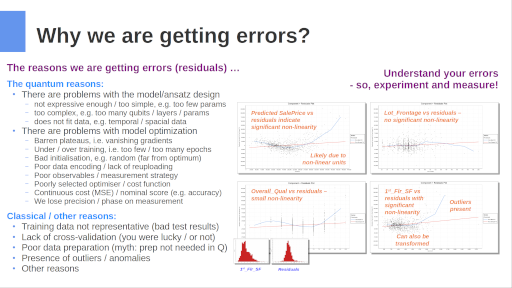
Figure. Why are we getting errors in QML development? |
||
| 26 Nov 2025 | Jacob Cybulski, "The Need for Democratization of Quantum Computing", Quantum AI Monthly series, iQafé. | LinkedIn, PDF, YouTube | |
|
In a few words:
Can quantum computing resolve the AI energy crisis? Abstract: This talk reflected on the potential energy crisis triggered by AI and considered quantum technology as part of a solution. It was part of an event Quantum Machine Learning, Quantum Sensing, and Quantum Benchmarking, in the Quantum Computing & AI seminar series at iQafé. The talk focused on the topic of Democratization of Quantum Computing. The key motivator of this presentation was the rapid scaling of Artificial Intelligence use, which faces a critical sustainability ceiling: the immense energy demand, which is customarily dealt with by redirecting existing energy resources to unsustainable AI data centers. Quantum Computing (QC) offers a vital alternative—a path to "smart efficiency" by relying on quantum algorithms to drive AI solutions at a fraction of the total energy use. This can be achieved today by gaining algorithmic efficiency and in the future by thermodynamic efficiency. However, a profound knowledge gap impedes this transition. Currently, unlocking quantum advantage requires deep expertise in quantum physics and mathematics, effectively locking the technology behind a high wall of specialization. This seminar argued that to realize the sustainable promise of the quantum era, we must decouple the utility of a quantum machine from the complexity of its mechanics. This was defined as the process of #quantum computing democratization, considered not as technological massification, but as the lowering of barriers for domain experts — biologists, financiers, and engineers — to utilize quantum tools without becoming quantum physicists. Drawing parallels with the evolution of Data Analytics — which transitioned from production of raw code aided with Statistical expertise to "drag-and-drop" analytic platforms — we explore the necessary technical and interface layers required to bridge this gap. Topics include the role of abstraction ("black-boxing"), invisible control over hybrid quantum-classical integration, interactive graphic user interfaces, and the emergence of AI as a translation layer. Ultimately, we demonstrate that democratizing access is not merely an economic imperative for the workforce, but a critical step toward solving the global energy challenges of the next generation of computing, and AI in particular. |
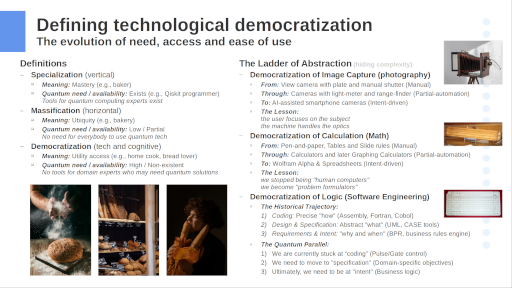
Figure. Hiding complexity is tech driver |
||
| 22 Nov 2025 | Jacob Cybulski, "Quantum Time Series Analysis", Faculty Development Program on Quantum Computing, Jagan Institute of Management Studies - JIMS Rohini, Delhi, India. | ||
|
In a few words:
QAEs are excellent in angaging all QML principles Abstract: This guest lecture was part of the Faculty Development Program (FDP) on Quantum_Computing at Jagan Institute Of Management Studies(JIMS Rohini). FDP is an India-wide program to equip faculty members, researchers and industry professional with knowledge and skills needed to engage in quantum computing. This session explained the methods of Quantum Time Series Analysis (QTSA), its models, algorithms, benefits, and challenges. First, the talk introduced the concepts of classical time series analysis and Quantum Machine Learning (QML) and presented the case for quantum time series analysis. Then, it covered various approaches to QTSA design and applications, it explained their benefits and its challenges. Finally, it used Quantum_Autoencoder (QAE) for time series as an ideal quantum model to illustrate the fundamental QML principles, such as reversibility of unitary operations, their differentiability, preservation of quantum information, and its destruction on qubits measurement or re-initialisation. |
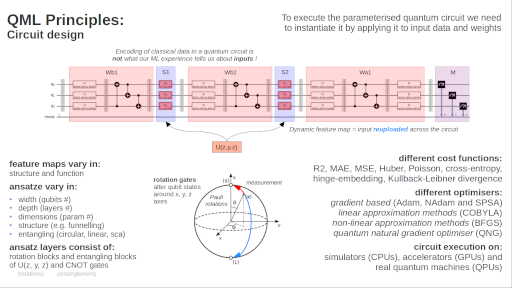
Figure. QTSA circuit design |
||
| 20 Nov 2025 | Jacob Cybulski, "Exploring Quantum Machine Learning (with Qiskit)", Qiskit Fall Fest'2025. Université Paris-Saclay, Paris, France. | PDF, GitHub, YouTube | |
|
In a few words:
QML is great yet full of potholes and traps! Abstract: This was the repeat of the Qiskit Fall Fest'2025 session given at Adam Mickiewicz University in Poland. It also covered the fundamentals of QML, explained PQCs and VQAs, data encoding and measurement, ansatz design, model training and testing. It placed more emphasis on explaining typical errors in data encoding and problems with measurements. No code examples were provided, however, the GitHub code with examples was made available for self-directed study and challenges. |
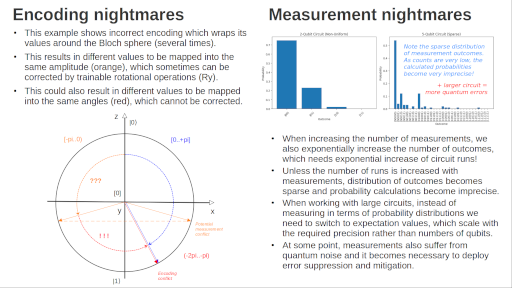
Figure. Encoding and measurement nighmares |
||
| 14 Oct 2025 | Sebastian Zając and Jacob Cybulski, "Time Under the Qubit's Control: Quantum Analysis of Time Series", XLIII Ogólnopolska Konferencja Naukowa im. Profesora Władysława Bukietyńskiego Metody i Zastosowania Badań Operacyjnych MZBO 2025. Zakład Wspomagania i Analizy Decyzji w Instytucie Ekonometrii, Kolegium Analiz Ekonomicznych w Szkole Głównej Handlowej w Warszawie, Poland. | ||
| 11-12 Oct 2025 | Jacob Cybulski (instructor) and Tomasz Rybotycki (mentor), with Paweł Gora (Coordinator of QPoland and CEO of QAIF) and Sebastian Zając (post-processing), "Quantum Machine Learning Workshop" (four sessions in two days), organized by QPoland and Quantum AI Foundation, Poland. |
PDFs: S1,
S2,
S3,
S4 Videos: Day 1, Day 2 Also: GitHub |
|
|
In a few words:
Q for ML enthusiasts and ML for Q experts. Abstract: This was the 2nd edition of the QML workshop that delivered a crash course in QML with PennyLane and PyTorch. The workshop had four intensive half-day sessions covering introduction to QML, quantum estimators, quantum classifiers and advanced quantum-classical hybrid models (with denoising QAEs). All topics were supported with demonstrations and exercises in PennyLane and PyTorch. Participants from around the world were learning quantum computing foundations, machine learning principles, as well as, good software engineering practices for developing complex quantum models. |
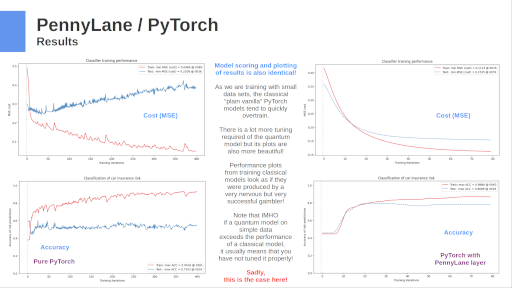
Figure. Model performance, quantum vs. classical |
||
| 10 Oct 2025 | Jacob Cybulski, "An introduction to Quantum Machine Learning in Qiskit", part of Qiskit Fall Fest UAM 2025, Adam Mickiewicz University in Poznań, Poland. |
BCD PDF BCD GitHub |
|
|
In a few words:
Qiskit Machine Learning provides a powerful QML development environment. Abstract: This session introduced QML concepts, an overview of Qiskit ML, and examples of how to develop and test a time series forecasting QML model in Qiskit. The talk covered a general introduction to QML, explained parameterized circuits, variational quantum algorithms, data encoding and measurement, ansatz design, model training and testing. It then explained the relationships between a quantum model, its Hilbert space representation, and its training in parameter space. The curse of dimensionality was discussed and related to the parameter space, state space and measurement, and sparsity of measurement outcomes. It then provided examples of developing quantum time series forecasting models. The Python+Qiskit code examples illustrated the talk and were made available on GitHub for self-directed study and challenges. |
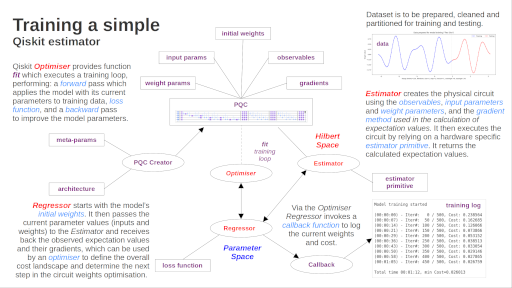
Figure. Training a Qiskit Estimator |
||
| 24 Aug 2025 | Jacob Cybulski, "Quantum Algorithms and Data Encoding for QML", QBronze167 | Quantum Computing and Programming Workshop (online), QWorld and QIndia, India, 9-10 and 23-24 Aug 2025. |
ABC PDF ABC GitHub |
|
|
In a few words:
Quantum model complexity is in the Hilbert space. Abstract: The aim of this session is to explore the creation and use of quantum machine learning models in Qiskit. It covers parameterised circuits, variational quantum algorithms, data encoding and state measurement, ansatz design and training. It also explains how to work with DL vs. QML models, It then discusses quantum model geometry and gradients. Finally, it presents various issues on parameters optimisation, and explains the curse of dimensionality. This QML ABC session explores the process of developing a simple quantum model in Qiskit. The session includes three practical labs that cover the QML concepts, models, and techniques. The first introductory lab will be demonstrated by the presenter. The second lab is designed to be completed by the participants and its tasks discussed on Discord. The final lab is a challenge, to be undertaken by the participants themselves. |
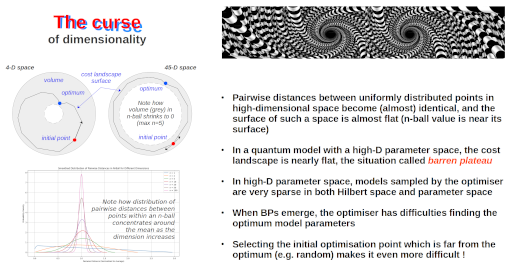
Figure. The curse of dimensionality |
||
| 12-13 April 2025 | Jacob Cybulski and the mentors Sebastian Zając, Tomasz Rybotycki, Amrit Chhetri, and James Mutua, with opening by Paweł Gora (Coordinator of QPoland and CEO of QAIF) "The First Quantum Machine Learning Workshop" (four sessions in two days), organized by QPoland and Quantum AI Foundation, Poland. |
PDFs:
S1,
S2,
S3,
S4 Videos: S1, S2, S3, S4 Also: GitHub |
|
|
In a few words:
Quantum modelling is an engineering task. Abstract: Quantum Machine Learning (QML) is a discipline seeking to take advantage of quantum mechanical processes to induce or enhance machine learning. It combines in novel ways the concepts and algorithms adopted from Quantum Computing and Machine Learning, and is underpinned by the Quantum Mechanics theory and formalism. This workshop provides an introduction to Quantum Machine Learning using PennyLane and PyTorch, with hands-on exercises and take-home challenges. The workshop includes four practical sessions that cover the QML concepts, models, and techniques. The sessions explore development of quantum estimators and classifiers, their training with various optimisers, loss and cost functions, as well as model testing and scoring using variety of metrics. It finally, explains how to create hybrid quantum-classical QML models. |
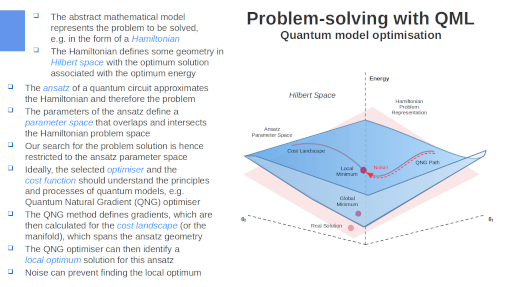
Figure. Problem-solving with QML |
||
| 10 April 2025 | Sebastian Zając and Jacob Cybulski, "Quantum Neural Networks for Credit Risk Modelling" (in Polish), Ogólnopolska Konferencja Naukowa Modelowanie Preferencji a Ryzyko. Uniwersytet Ekonomiczny w Katowicach, Poland. | ||
| 15 Mar 2025 | Jacob Cybulski and Sebastian Zając, "Data Preparation for Quantum Encoders", Quantum Machine Learning Conference (Zoom), Quantum AI Foundation and QPoland, Poland. | ||
| 15 Mar 2025 | Jacob Cybulski, "Measuring and Interpreting the States of Temporal Quantum Models," Quantum Machine Learning Conference (Zoom), Quantum AI Foundation and QPoland, Poland. | PDF, YouTube | |
|
In a few words:
Why Temporal Quantum Models (TQM) are so damn difficult to train !?! Abstract: Jacob’s recent presentations focused on the analysis of time-series and signals using quantum machine learning. They covered considerations of quantum models design, methods of embedding classical data, training of quantum models, and the analysis of temporal data. This talk, however, discusses some practical and theoretical issues of measuring the state of a temporal quantum model, and the subsequent interpretation of measurement results in the context of various analytic tasks. |
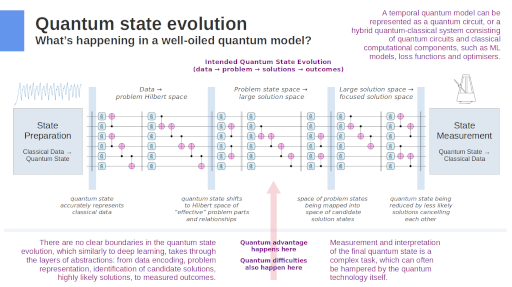
Figure. Quantum state evolution in a temporal quantum model |
||
| 25 Feb 2025 | Jacob Cybulski, "Jacob vs Quantum: A first-person view of quantum machine learning," School of IT Quantum Day, SIT, Deakin Downtown, Deakin University, Melbourne, Australia. | PDF Video | |
|
In a few words: Dreams weave qubits tight, Through the lattice of the night— Code bends time and light. Abstract: This presentation is a personal journey through the works in quantum machine learning. In about 10 minutes, this presentation explores Jacob's recent QML projects, which focus on the experimental investigation of complex quantum models. Some of the reported work covers quantum time series analysis, encoding and decoding of its data, noise removal, anomaly detection of forecasting. Others, delve into models trainability, and especially their capacity to learn. A preview of the current work in quantum graphs and quantisation of their classical counterpart is also given. |
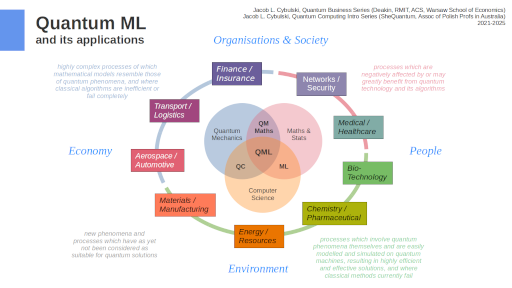
Figure. QML and its applications |
||
| 20 Jan 2025 | Jacob Cybulski, "Business Value of Quantum Computing," Guest lecture, MIS782 (Value of Information), Dept of IS and Business Analytics, Deakin Business School, Deakin University, Melbourne, Australia. | ||
|
In a few words:
Quantum computing development is neither fast nor easy, but it is very exciting! Abstract: This presentation explores the quantum technology and its applications, with a view to assess their business value. In the process, it compares the level of investment in quantum technology within Australia and around the World. Most importantly, the presentation introduces the fundamental concepts of quantum information science (such as qubits, gates and measurements) and the principles of quantum computation (using quantum circuits). It reviews several classes of quantum machine hardware, each featuring a distinct qubit technology, and gives an overview of software development kits and platforms for such quantum machines. It shows examples of how quantum applications are being developed. The presentation then scans the rapidly growing field of quantum computing applications, including those in quantum machine learning and quantum optimisation. It reflects on the problem types, which are a good match for the effective and highly efficient quantum solutions. It concludes with some assessment of quantum technology benefits and drawbacks. It finally provides some hints on how to enter this highly innovative, exciting, profitable, yet challenging, field of quantum technology. |
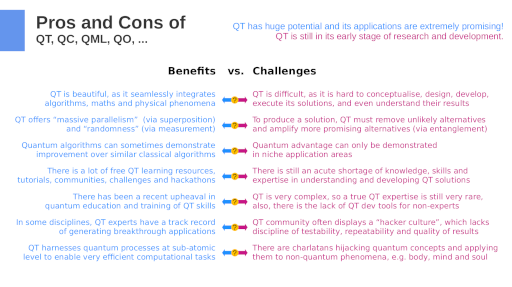
Figure. Business value of quantum technology |
||
| 25-29 Nov 2024 | Jacob Cybulski and Sebastian Zając, "The Art of Data Encoding and Decoding for Quantum Time Series Analysis" (Poster), 8th International Conference on Quantum Techniques in Machine Learning (QTML), University of Melbourne, Melbourne, Australia. | Poster PDF | |
|
In a few words:
It is not the model's complexity that gives it an advantage, but rather its compatibility with data. Abstract: As time series feature unstructured data and unique processing requirements, they do not easily fit conventional approaches to quantum modeling. This paper therefore presents various approaches to quantum encoding and decoding of time series data, which are key to their quantum analysis. Each approach has the potential to enhance or impede the model’s ability to represent and manipulate data. Each approach also places constraints on the execution of its quantum model and has a major impact on the model performance. The paper compares the selected approaches and evaluates their performance. |
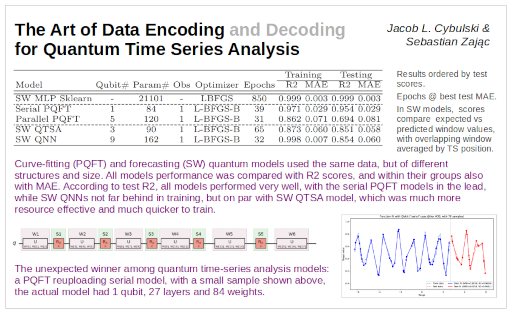
Figure. Comparison of QTSA approaches |
||
| 11 Oct 2024 | Jacob Cybulski, "Introduction to Quantum Machine Learning", Part of the Workshop on Emerging Research in Quantum Computing, Deakin Downtown, Melbourne. | PDF, GitHub | |
|
In a few words:
We explored the fundamental principles of parameterisation and optimisation of quantum models |
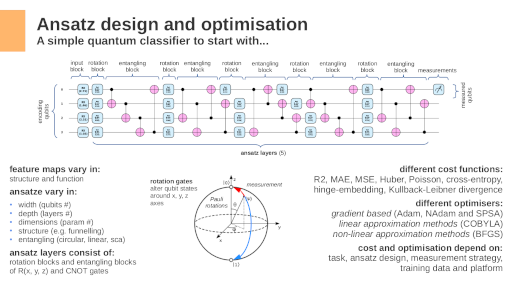
Figure. QML ansatz design |
||
| 11 Oct 2024 | Jacob Cybulski, "Quantum Neural Networks", Part of the Workshop on Emerging Research in Quantum Computing, Deakin Downtown, Melbourne. | PDF, GitHub | |
|
In a few words:
We revealed the secrets of the process to develop complex quantum models - quantum neural nets! |
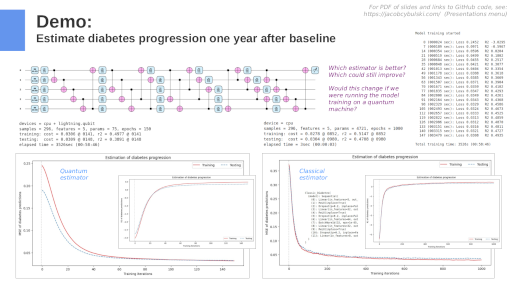
Figure. QNN demo |
||
| 6 Oct 2024 | Jacob Cybulski and Sebastian Zając, "Development of Quantum Autoencoders" (5 Oct 2024, 17:00-19:00 EDT / 6 Oct 2024, 8:00-10:00 AEST), Part of the Washington DC / Toronto / Warsaw Quantum Computing Meetups. | PDF, YouTube, Linkedin | |
|
In a few words:
Quantum models can take advantage of the model features absent from classical systems, while hybrid models can inject the model features missing from the pure quantum systems Abstract: This presentation describes development aspects of variational quantum autoencoders. As an example, we will discuss the “worst case” scenario of a quantum autoencoder used in denoising of time-series and signals. The talk highlights the quantum model’s architectural choices, data encoding strategies, ansatz structures and their parameterisation, circuit measurement alternatives and the interpretation of measurement results. Practical issues in training such models will also be covered, to include the selection of an optimiser and its loss function, as well as the execution of a quantum model on simulators, GPU accelerators and QPUs. Methods of model testing will also be explained. |
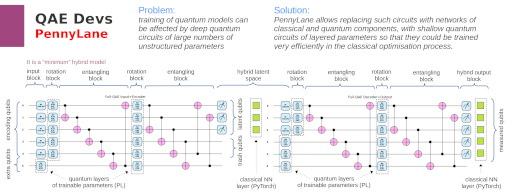
Figure. Hybrid QAE model |
||
| 2-3 July 2024 | Jacob Cybulski and Sebastian Zając, "Design Considerations for Denoising Quantum Time-Series Autoencoder.", Int. onf. on Computational Science (ICCS), Malaga, Spain. | ||
|
In a few words:
The lack of quantum model transparency hampers the performance of classical optimizers used in QuTSAE development. Abstract: This presentation explains the main design decisions in the development of variational quantum time series models and denoising quantum time series autoencoders. Although we cover a specific type of quantum model, the problems and solutions are generally applicable to many other methods of time series analysis. The presentation highlights the benefits and weaknesses of alternative approaches to designing a model, its data encoding and decoding, ansatz and its parameters, measurements and their interpretation, and quantum model optimization. Practical issues in training and execution of quantum time series models on simulators, including those that are CPU and GPU based, as well as their deployment on quantum machines, are also explored. All experimental results are evaluated, and the final recommendations are provided for the developers of quantum models focused on time series analysis. |
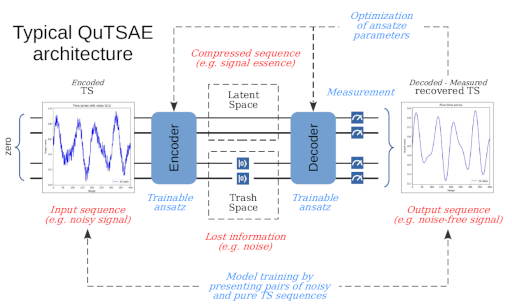
Figure. Typical QuTSAE architecture |
||
| 12-13 Feb 2024 | Jacob Cybulski and Thanh Nguyen, "Strategies for dealing with barren plateaus in training quantum machine learning models", Melbourne Quantum Summit, Ormond College, The University of Melbourne, Melbourne, Australia. | PDF, YouTube | |
|
In a few words:
This talk is about how to break good quantum models with good strategies to make them worse. Abstract: Quantum machine learning involves development of models, such as quantum neural networks or quantum support vector machines, which commonly consist of parameterised quantum circuits that can be trained using a hybrid quantum-classical process. The process uses a sample of data to guide the quantum model optimisation, which is performed on a classical computer and which is responsible for varying the circuit parameters to reduce the cost function. Typically, the cost function is a classical computation estimating the difference between the circuit measurements taking place on a quantum machine and the expected values specified by the data sample. Such a hybrid process can be affected by the emergence of barren plateaus - flat areas in the landscape of the cost function, which prevent effectiveness of the quantum model optimisation. In this short presentation we will explain the main causes of barren plateaus, outline some strategies for dealing with them, and assess the impact of these strategies on the model's capacity to learn. |
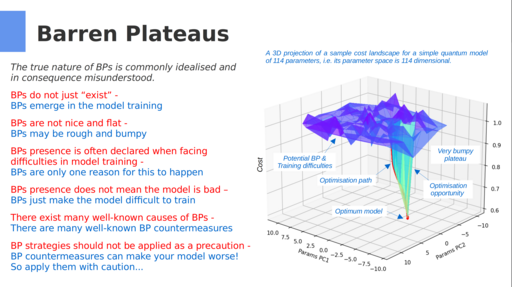
Figure. Barren plateaus in VQM |
||
| 19 Oct 2023 | Jacob Cybulski, "Overview of Quantum Computing: Revolution or Evolution?", Association of Polish Professionals in Australia, Melbourne, Australia. | PDF, Medium | |
|
Abstract:
Quantum computing is a technological phenomenon, which promises great improvements to information processing but which challenges existing computing practices and standards. Quantum computing harnesses the principles of Quantum Mechanics to support computation, often resulting in algorithms capable of solving previously unsolvable problems and reducing information processing time from years to minutes. Compared with traditional computer systems, quantum computing works on entirely different principles, which at this stage of technological development requires scientific knowledge and specialist training, which forces early adopters of this technology, such as financial and manufacturing organisations, to seek the skills of mathematicians, physicists and machine learning researchers. This seminar provides an overview of quantum computing concepts, its current developments and applications, available software and hardware, as well as its benefits and pitfalls. It will answer the fundamental questions whether or not the new technology is a revolution of computing, a stepwise refinement of the current trends, is it a threat to our future, or perhaps a blessing for human development. |
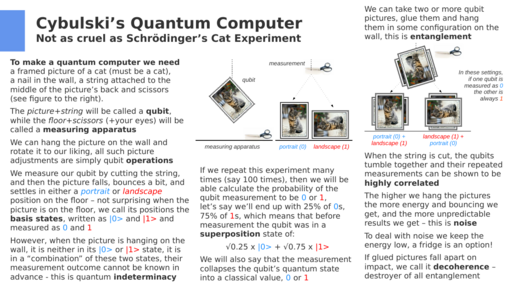
Figure. Cybulski's quantum machine |
||
| 19 Sept 2023 | Jacob Cybulski and Nguyen Ngo Cong Thanh, "Investigation of Barren Plateaus Mitigation Strategies in the Development of Variational Quantum Models: An Overview of Problems and Solutions", Warsaw School of Economics, Poland. | ||
|
Abstract:
Training of variational quantum models, such as quantum neural networks, can be affected by the emergence of barren plateaus - flat areas in the landscape of the cost function, which negatively impact the effectiveness of the model parameter optimisation. There exist several approaches to dealing with the formation of barren plateaus. In our research, we investigated three most commonly used approaches, i.e. restricting the circuit depth, effective parameter initialisation, and selection of an appropriate cost function. In some cases, such techniques, while avoiding barren plateaus, may actually reduce the model capacity to learn. This project therefore investigated an impact of barren plateaus countermeasures on the quantum model capacity to learn, which we measured in terms of the model effective dimension, which scales with the model ability to generalise its training data. |
|
||
| 10 Nov 2022 | Jacob Cybulski, "Business Applications of Quantum Computing: Some Promises and Words of Caution", Part of Quantum Business Series, Department of Information Systems and Business Analytics, RMIT, Melbourne. | ||
|
Abstract:
Quantum computing is a fascinating new area of technological development, which aims at exploiting processes occurring between elementary particles to perform highly efficient computation. Compared with traditional computer systems, quantum computing works on entirely different principles, allowing tackling problems which until recently have been considered practically unsolvable with classical computer hardware. The new discipline requires expertise intersecting Particle Physics and Data Science, and good knowledge of advanced Mathematical concepts. And yet, quantum computing attracts enthusiasts, researchers, and developers able to create novel solutions to complex problems in science, business, and engineering. This seminar will provide a bird view of quantum computing concepts, some of its accomplishments and its promises in diverse application domains, including Astronomy, Weather Forecasting, Chemistry, Pharmacology, Finance, Logistics, Optimisation, Computer Communication and Security, Machine Learning, and of course software and hardware for quantum computing. At the same time, the seminar will also explain the challenges and limitations of the quantum technology. |
|||
| 13 Oct 2022 | Jacob Cybulski, keynote "Time Series Analysis Using Quantum Machine Learning", Workshop on Quantum Machine Learning, 13 October 2022, organised in collaboration with QWorld, QPoland, QIndia and Quantum AI Foundation. In association with IEEE Conference Trends in Quantum Computing and Emerging Business Technologies - TQCEBT 2022. | PDF, GitHub | |
|
Abstract:
This workshop presents the concepts and methods of Quantum Time Series Analysis. While time series analysis and forecasting are essential for AI business applications, this area seems to be neglected by the mainstream researchers and practitioners of Quantum Machine Learning. There are several reasons for this situation - the first is that well-established approaches to classical time series analysis are already computationally efficient (no need for quantum methods), the second is discrepancy between known time series algorithms and quantum computing methods (no simple pathway to quantum solutions), and the third is that dealing with temporal data with quantum technology is difficult (steep learning curve). And yet, there exist examples of successful quantum computing solutions to time-series analysis in Finance, Medicine and Engineering. This workshop aims to provide the participants with the foundations of quantum time series analysis, its main concepts, examples of applications where quantum methods are likely to give quantum advantage, and the relevant quantum machine learning algorithms. The workshop is practical and offers opportunities of hands-on exercises in quantum time series analysis, which cover quantum encoding of temporal data, simple manipulation and analysis of such data, variational and stochastic methods of time series fitting and forecasting (e.g. using quantum neural networks). The provided Jupyter notebook will require some knowledge of Python, the basics of Qiskit (and IBM Quantum environment) and the concepts of quantum neural network techniques. |
|
||
| 29 Sept 2022 | Jacob Cybulski, "Key Concepts in Quantum Time Series Analysis", School of IT, SEBE, Deakin University, Burwood. | ||
|
Abstract:
In recent years, breakthroughs in quantum computing methods, as supported by the widely available software and hardware, provided great opportunities for advancing quantum machine learning (QML). In some cases, in spite of limitations of the current quantum technology, such efforts lead to great improvement in effectiveness and efficiency of QML algorithms. In other cases, where efficiency gains may not be apparent at this point in time, quantum researchers developed completely new approaches to data analysis, creation of QML models and their applications. Examples of such work include quantum neural networks, quantum support vector machines, quantum kernel methods and quantum optimisation methods, to name just a few. Surprisingly, in spite of the potential benefits, there is very little research on applying QML methods to time series processing, such as the effective encoding of time-based data on quantum devices, analysis of such representations and interpretation of results obtained from quantum algorithms to support decision making. This seminar introduces the main QML concepts and their relevance to time series processing. It explains a selection of novel quantum algorithms for time series analysis and demonstrates their workings in IBM Qiskit. |
|
||
| 13 Sept 2022 | Jacob Cybulski, "Business Applications of Quantum Computing: Opportunities and Challenges for Software Developers", Part of Quantum Business Series, Australian Computer Society, Melbourne. ACS Edition - for the seminar participants. | ACS Web Site, PDF | |
|
Abstract:
While quantum computing attracts huge business and government investments and its research results are magnified by popular press, the expectations of practical breakthroughs in business applications of this emerging technology are incredibly high. This presentation dispels some of the common myths of quantum computing, explains its reality and some of the promises claimed by quantum technology vendors and researchers. By walking through the fundamental principles of quantum computing, the currently used tools and practical applications, the seminar clears both the hype and negativity towards the new technology, and casts some light on its current trends, progress, and timelines. The seminar clarifies some of the challenges faced by quantum hardware manufacturers, the gaps between quantum software functionality vs its utility and productivity, difficulties in the transition of quantum applications from lab to practice, and the severity of skill shortages in the quantum computing market. Finally, software and application development opportunities for this technology are highlighted. In conclusion, the future of quantum computing is optimistic with huge potential for researchers, vendors, application developers, and investors. |
|
||
| Sept 2021 | Jacob Cybulski, "Experiences in the Quantum Community: IBM Quantum and Qiskit Perspective", Part of the Quantum Computing Workshop: Quantum Computing event with IBM, Innovation Series, School of IT, SEBE, Deakin University, Burwood. | ||
|
Abstract:
This seminar explains a typical pathway to a career in quantum computing. It discusses the reasons for the recruiters in this area to search for a wide range of knowledge, skills and talents. It warns the newcomers that quantum computing demands some prior study of maths and programming. It explains the knowledge scaffolding including quantum computing tools, the discipline foundations, machine learning and hardware. The seminar then outlines the opportunities for learning and engagement with the quantum community. Finally, it promotes online training courses, regular challenges and hackathons, which give the learners the edge for learning state-of-the-art of quantum computing. |
|||
| Sept 2021 | Jacob Cybulski, "Quantum Computing and Quantum Machine Learning: Concepts, Applications and Major Players", School of IT, SEBE, Deakin University, Burwood. | ||
| Extended version prepared for SheQuantum, with a YouTube video and a promotion video. | |||
|
Abstract:
Quantum computing is a new and rapidly evolving area of research and development. It concerns building and using information processing systems, which are capable of harnessing phenomena at atomic and sub-atomic scale. Such systems work on entirely new principles of computation and offer breakthroughs in solving problems, which are deemed practically unsolvable with classical machines. In the last few years, quantum computing captured the attention of computer vendors, research labs and the enterprise. It attracted phenomenal government grants and business investment, and stirred imagination of academics, students, and citizen scientists. And yet, its fundamental concepts are commonly misunderstood, its claims grossly exaggerated and promises misplaced. This seminar therefore aims to give a high-level overview of quantum computing and its sub-discipline quantum machine learning. It explains their basic concepts, their tools and devices, as well as their practical applications. It then discusses the benefits and limitations of quantum technology. It finally, outlines the future challenges and opportunities for research and education. |
|||
| June 2021 | Rens Scheepers and Jacob Cybulski, "Mapping the Minds of Many: Methodological Principles for Analysing Large Bodies of the Research Literature through Unsupervised Text Analytics", DISBA, Burwood. | ||
|
Abstract:
Developments in text analytics are enabling computer-assisted analyses of large bodies of research literature. Unsupervised text analytics can yield results beyond what traditional human-directed coding and analysis can produce, by letting the literature speak, rather than imposing pre-conceived conceptual mapping on the process. This research explores how a large body of data science literature was analysed through unsupervised text analytics. Based on our experience of this process, advice in the research methods literature, and hermeneutic principles, we are currently developing our learning into a more generic method. The method will identify steps involved in this iterative process, guiding principles, caveats and pitfalls for researchers seeking to utilise machine-assisted analysis of large bodies of published research. |
|
||
| Oct 2020 | Jacob Cybulski and Rens Scheepers, "Data Science in Organizations: Conceptualising its Breakthroughs and Blind Spots", DISBA webinar series 4, Deakin Business School, Burwood. | ||
|
Abstract:
The field of data science emerged in recent years, building on advances in computational statistics, machine learning, artificial intelligence, and big data. Modern organizations are immersed in data and are turning toward data science to address a variety of business problems. While numerous complex problems in science have become solvable through data science, not all scientific solutions are equally applicable to business. Many data-intensive business problems are situated in complex socio-political and behavioral contexts that still elude commonly used scientific methods. To what extent can such problems be addressed through data science? Does data science have any inherent blind spots in this regard? What types of business problems are likely to be addressed by data science in the near future, which will not, and why? In this seminar, we develop a conceptual framework to inform the application of data science in business. The framework draws on an extensive review of data science literature across four domains: data, method, interfaces, and cognition. We draw on Ashby’s Law of Requisite Variety as theoretical principle. We conclude that data-scientific advances across the four domains, in aggregate, could constitute requisite variety for particular types of business problems. This explains why such problems can be fully or only partially addressed, solved, or automated through data science. We distinguish between situations that can be improved due to cross-domain compensatory effects, and problems where data science, at best, only contributes merely to better understanding of complex phenomena. |
|
||
Selected Past Presentations |
|||
| Oct 2019 | Jacob Cybulski, Van Nguyen and Chris Dubelaar, "Brand Segmentation and the Analysis of Vendor Behavioural Patterns: Application of Unsupervised Shapelet Discovery to Sales Data", Deakin Business School, Burwood. | ||
| Sept 2019 | Jacob Cybulski, "Generative Adversarial Networks, Part 1", Deakin Business School, Burwood. | ||
| Sept 2019 | Jacob Cybulski, "Data Clustering and Segmentation in R for Business", Melbourne Users of R Network (MelbURN), Melbourne. | YouTube / GitHub | |
| Aug 2017 | Rens Scheepers and Jacob Cybulski, "Advanced Analytics and Deep Learning for Business", Deakin Business School, Burwood. | ||
| Aug 2017 | Jacob Cybulski, "Predictive Analytics for the Uninitiated", Deakin Business School, Burwood. | ||
| Jun 2017 | Jacob Cybulski, "The Horizons of Data Visualisation in Business Landscape", Deakin Business School, Burwood. | ||
| Jan 2017 | Jacob Cybulski, "Visual Analytics and Data Mining for Business Problem Solving and Decision-Making", Syncron, Warsaw, Poland. | ||
| Jan 2017 | Jacob Cybulski, "Collaborative Visual Analytics for Business Sensemaking: Rethinking the Role of Interaction", Laboratory of Visual Analysis, Interdisciplinary Centre for Data and Computational Modelling, Warsaw University, Poland. | ||
| Nov 2016 | Jacob Cybulski, "Principles of Text Visualisation", Innovation Hub, College of Business and Economics, ANU, Canberra. | ||
| May 2016 | Jacob Cybulski, "Interactive Visual Analytics: From charts and maps to 3D Data Terrain", Master of Business Analytics Residential Program, Deakin University, Dept of Information Systems and Business Analytics, Burwood. | ||
| Apr 2016 | Jacob Cybulski, "Tribute to Marvin Minsky: What is the Society of Mind?", Designa Monologues in conversation with Dr John Lenarcic, RMIT School of Business IT and Logistics, Melbourne. | ||
| Oct 2014 | Jacob Cybulski, "Graph Visualisation and Analytics", Deakin University, School of Information and Business Analytics, Burwood. | ||
| Aug 2014 | Jacob Cybulski, Susan Keller and Dilal Saundage "Metaphors in Interactive Visual Analytics", Deakin University, School of Information and Business Analytics, Burwood. | ||
| May 2014 | Jacob Cybulski, "Teamwork for collateral learning", ACDICT, Alta Forum, UTS, Sydney. | ||
| Mar 2012 | Jacob Cybulski, "Using eSims in Teaching", Deakin University, School of Information Systems, Burwood. | ||
| Sept 2011 | Jacob Cybulski, "First Person Art Online", Deakin University, School of Information Systems, Burwood. | ||
| Oct 2010 | Jacob L. Cybulski, "Hermeneutic method: Theory of interpretation in action", RMIT University, School of Business IT, Melbourne. | ||
| Mar 2010 | Jacob Cybulski and Chris Jones, "Problem Solving for IT Professionals", Australian Computer Society, Melbourne. | ||